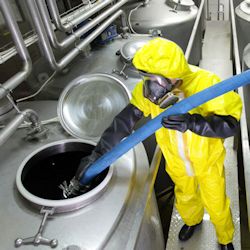Chemical Hazards
Chemicals directly or indirectly affect our lives and are essential to our food, our health, and our lifestyle. Having readily available information on the hazardous properties of chemicals, and recommended control measures, allows the chemicals to be managed safely.

Under the GHS, a hazardous chemical may be classified as a substance, product, mixture, preparation, or another term that represents a physical hazard or a health hazard.
Physical hazards. Physical hazards result in an injury of some kind and are classified as posing one of the following hazardous effects:
- explosive;
- flammable (gases, aerosols, liquids, or solids);
- oxidizer (liquid, solid or gas);
- self-reactive; pyrophoric (liquid or solid);
- self-heating; organic peroxide;
- corrosive to metal;
- gas under pressure; or
- in contact with water emits flammable gas
Health Hazards. Health hazards result in illness of some kind and are classified as posing one of the following hazardous effects:
- acute toxicity (any route of exposure);
- skin corrosion or irritation;
- serious eye damage or eye irritation;
- respiratory or skin sensitization;
- germ cell mutagenicity;
- carcinogenicity;
- reproductive toxicity;
- specific target organ toxicity (single or repeated exposure); or
- aspiration hazard.
Employees may be exposed to chemicals during normal operations or in a foreseeable emergency. Even though an employer is not responsible for the manufacture of hazardous chemicals, the employer has the responsibility for transmitting information about hazardous chemicals to his or her employees.
Employees, such as office workers or bank tellers who encounter hazardous chemicals only in non-routine, isolated instances are not covered. For example, an office worker who occasionally changes the toner in a copying machine would not be covered by the standard. However, an employee who operates a copying machine as part of her/his work duties would be covered by the provisions of the HCS.
Knowledge Check Choose the best answer for the question.
1-5. According to the Global Harmonized System (GHS), what are the two main categories of hazards posed by chemicals in the workplace?
You forgot to answer the question!
